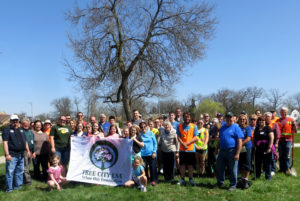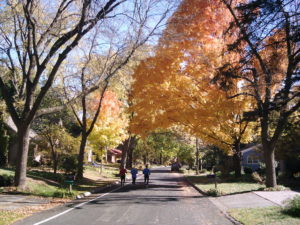The Urban Tree Alliance (UTA) received funding from the WI DNR urban forestry grant program to develop the Housing Partnerships project. Continue reading “Urban Tree Alliance partners with Community Development Authority to complete tree inventory”
Archives
Another productive year for Wisconsin urban forestry!
Written by Jeff Roe, Urban Forestry Team Leader
As I reflect on this year, what stands out to me is cohesion and enthusiasm. Within the DNR, Division of Forestry, Urban Forestry Team and with our partners, I feel that communication, enthusiasm and follow-through have been hallmarks of this year.
Continue reading “Another productive year for Wisconsin urban forestry!”
2019 Urban forestry grant recipients announced
Thirty-eight communities, nonprofit groups, and counties will share over $532,000 in 2019 state grant dollars to promote and sustain urban forest resources in Wisconsin. Continue reading “2019 Urban forestry grant recipients announced”
Improve employee attitudes and well-being with exposure to trees and nature
The start of another weekday and we commute to work, only to be met by a dark cubicle or office covered in various shades of beige and grey. Ever wonder why your mood starts to match the walls? It’s because workplace environment contributes to employee health.
Continue reading “Improve employee attitudes and well-being with exposure to trees and nature”
Tree City USA applications are due
 Trees make a town a special place to live. Trees shade homes, businesses and streets. They clean air and water, increase property values, reduce energy costs and make neighborhoods greener, safer and healthier. By becoming recognized and fulfilling the standards of Tree City, Tree Line, or Tree Campus USA, communities, companies and campuses are putting their citizens first and building a better community with the forest outside your door. Thousands of communities across America are enjoying these many benefits of trees and being recognized as a Tree City USA.
Trees make a town a special place to live. Trees shade homes, businesses and streets. They clean air and water, increase property values, reduce energy costs and make neighborhoods greener, safer and healthier. By becoming recognized and fulfilling the standards of Tree City, Tree Line, or Tree Campus USA, communities, companies and campuses are putting their citizens first and building a better community with the forest outside your door. Thousands of communities across America are enjoying these many benefits of trees and being recognized as a Tree City USA.
Markets growing for urban wood across Wisconsin
Written by Scott Lyon, Forest Products Specialist
Many communities have expressed greater interest in local goods and services over the last few years; as a result urban wood recycling efforts have increased in Wisconsin. The increase of trees killed by invasive insects and disease caused many municipalities to seek alternative uses for urban wood rather than disposing material in a landfill. Recent efforts to market this growing source of material and develop ways to recycle urban trees within communities led Wisconsin to become one of the leading states in urban wood utilization. Continue reading “Markets growing for urban wood across Wisconsin”
Accounting for trees in stormwater models
Accounting for Trees in Stormwater Models is a resource to share with stormwater engineers. The paper is intended to help the stormwater engineering community more easily account for trees in runoff and pollutant load calculations and incorporate them into stormwater management strategies. It summarizes existing hydrologic and hydraulic models that can be applied at the site and small watershed scales to account for the stormwater benefits of conserving existing trees and/or planting new trees. The paper also includes examples of specific techniques to modify stormwater models to account for urban tree benefits, as well as associated resources and tools for estimating the hydrologic benefits of trees in the urban landscape. Continue reading “Accounting for trees in stormwater models”
Does your community have forest-friendly development practices?
 Not every city in Wisconsin has a municipal code or ordinance that includes trees, and even then, those that do have codes may not have forest-friendly ones. A new resource has been created and has taken care of the hard work of determining if your city’s codes are forest-friendly; and if they are not, the resource provides advice on how trees can be more welcome in your neighborhoods. Continue reading “Does your community have forest-friendly development practices?”
Not every city in Wisconsin has a municipal code or ordinance that includes trees, and even then, those that do have codes may not have forest-friendly ones. A new resource has been created and has taken care of the hard work of determining if your city’s codes are forest-friendly; and if they are not, the resource provides advice on how trees can be more welcome in your neighborhoods. Continue reading “Does your community have forest-friendly development practices?”
Improve mental health with exposure to trees and nature
If stress about the upcoming holiday season is beginning to build, put on your coat and hat, get yourself outside and walk around under your neighborhood trees. Exposure to nature reduces depression, anxiety and stress! Time spent in nature provides a wealth of mental health benefits. Continue reading “Improve mental health with exposure to trees and nature”
Social media study explores how to connect homeowners with arborist
How do people respond differently to messages about caring for the trees in the yard? Which messages motivate homeowners to contact a certified arborist to help them care for their trees? This spring, the Wisconsin DNR partnered with the Wisconsin Arborist Association (WAA), University of Wisconsin-Madison and UW-Extension to design a Facebook outreach campaign to test these questions. A new resource with the results and social marketing insights from the study is now available.
Continue reading “Social media study explores how to connect homeowners with arborist”
